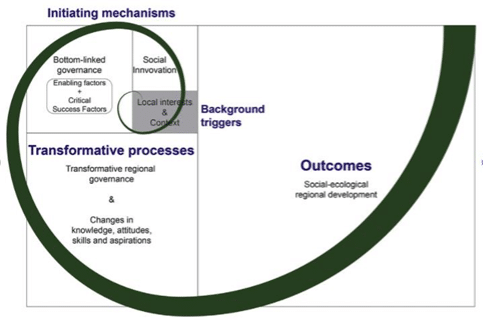There are two elements that constitute social innovation: the social element and the innovative element. On the social side, social innovation is innovation with a social outlook, or a social dimension. It is concerned with finding solutions to social problems: reducing poverty and its consequences (hunger, access to housing, reduction of unemployment), offering quality education, ensuring good health for the population, reducing inequalities, improving democratic participation, etc. In that sense, the UN Sustainable Development Goals (SDGs) are a good target lens: Social innovations often aim to act towards achieving one of these goals. The goal of social innovation is to improve society. On the innovation side, it has to be a novel solution to a social problem that is more effective, efficient, sustainable than existing solutions (Phills et al. (2008)). This novelty can concern a process, a product, a different mode of organisation.
Figure 1: Analytical framework for transformative social innovation

The concept of social innovation presents three important dimensions, taking into account: i) the social mechanisms of innovation; ii) social responsibility; and iii) social and public activities need innovation to tackle issues such as climate change, inequalities and poverty, labour market and employment, gaps in healthcare and education systems, demographic issues like ageing and migration.
Wehubit Programme – Setting the example
Technopolis Group has evaluated the Wehubit programme, a digital social innovation programme of the Belgian Cooperation Agency Enabel. Technopolis has also made recommendations implemented in the second version of the programme, which is currently at the start of its implementation. The general objective of the programme is to support the priority countries of the Belgian cooperation, while contributing to achieving their SDGs through digitalisation by supporting NGOs, academic actors, and other organisations, in a multi-stakeholder approach. The digitalisation process involves increasing the usage and access to digital solutions (through financial supports and knowledge-sharing activities) while offering better living conditions in developing and emerging countries (through strengthened governance and partnerships within the digital social innovation community).
Wehubit financial supports
The first and main level of action of Wehubit is to finance projects through a competitive fund. The identification of projects is made though the thematic Calls for Proposals (CfP). Starting in 2022, six Calls for Proposals were launched under the following themes:
- Women and Young People’s Rights, Inclusion and Empowerment
- Climate-smart Agriculture
- E-health
- Closing the Digital Divide Through Education, Training and the World of Work
- Resilient Cities: Towards Inclusive and Sustainable Urban Development
- Edtech: Use of Education Technology to Improve Quality and Continuity of Teaching and Learning(this call is funded by the European Union)
Wehubit aims to disseminate existing digital solutions that can be scaled up and applied to a variety of sectoral contexts and geographical locations.
Success stories
Wehubit positions itself as a reliable structure for the efficient and transparent management of funds from public and private investors willing to promote digital development projects. As such, clear evidence demonstrating social and novel achievements of the Wehubit programme can be found all around the world. In the first CfP on Women and Young People’s Rights, Inclusion and Empowerment, the Oxfam international project in Palestine achieved all its objectives, training young people on cyberviolence, and supporting referral services for survivors of cyberviolence. In Lewuti, Uganda a technology project provided 7,723 women with legal support. Nearly 6,000 women were trained on their rights and on the use of digital solutions for access to justice, and a total of 3,538 women were able to receive this legal support through the various digital platforms.
An alternative to “traditional approaches”
Wehubit supports projects in their scaling up phase by providing assistance to projects that have demonstrated potential but need support to reach a more impactful phase. Wehubit has two pillars of action: the CfP and focusing on knowledge-sharing through the “Knowledge Exchange Network”, which are important differentiating factors. An overarching principal of the Wehubit programmes is its human rights-based approach (HRBA), which intends to focus on specific marginalised (disempowered, disadvantaged) and discriminated (stigmatised, criminalised) target groups: Women, unemployed youth, ethnic minorities, remote populations, migrants, refugees, stateless, albinos, the elderly, PLWD, PLWH, populations living in poverty, the illiterate, sexual minorities (LGBTI), commercial sex workers, and others depending on local context and HRBA. Wehubit intends to support digitalisation by enabling the target groups to effectively claim their rights – empowerment, access, inclusion and accountability.
Wehubit’s potential
The programme provides an appropriate, much needed response to the funding gap faced by digital social innovators; it also provides capacity building and networking opportunities.The positioning of Wehubit as a scaling-up tool for public non-profit organisations is quite unique. It has identified a niche target and is able to avoid duplication from other international instruments. Indeed, other initiatives such as France’s Fonds d’Innovation pour le Développement or USAID’s Development Innovation Ventures greatly differ from the Wehubit Programme.
To Technopolis’ knowledge, Wehubit is the only programme supporting digital innovations that has specifically developed a community of practice network (KEN) and fosters knowledge exchange between beneficiaries, which has important potential. However, the approach of working through networks for capacity building is currently adopted notably by the ASToN network (digital cities), funded by the AFD, and the Science Granting Councils Initiative (SGCI), funded by a consortium of bilateral agencies, led by IDRC. The network approach has proven quite successful in these initiatives as well as with Wehubit.
Within Enabel and the Belgian cooperation itself, the Wehubit programme is also unique and has strong potential as an agile instrument at the service of the D4D and Innovation strategies. Wehubit is able to bring concrete, tangible and visible use cases to Enabel and the Belgian development cooperation in priority topics or thematics and sectors. It still has the nascent potential of being the social innovation incubator for Enabel.
Bibliography
Castro-Arce, K.; Vanclay, F. Transformative social innovation for sustainable rural development: An analytical framework to assist community-based initiatives. Journal of Rural Studies. 2020
Phills, J. A., Jr., Deiglmeier, K., & Miller, D. T. (2008). Rediscovering social innovation. Social Innovation Review, Fall 2008, 34–43



